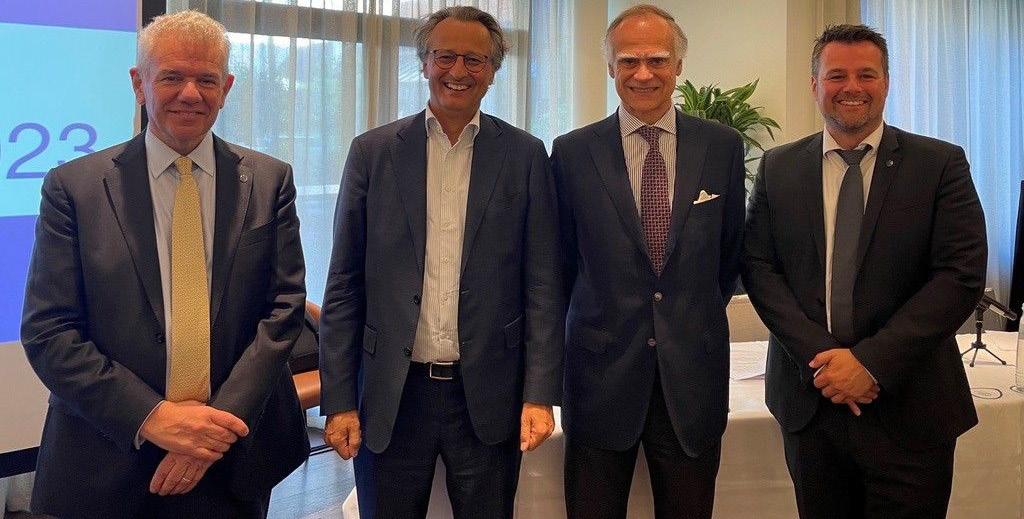
8 minute read
Committee of Underwriters
Fabrice Nessi
Fabrice Nessi Chair of the Committee of Underwriters
Advertisement

Last month, during the ICISA AGM Week, our Committee of Underwriters enjoyed a record attendance of 29 representatives from across the ICISA member companies. Beyond the usual European representatives, we had some members from APAC, Latam and North America, which is not always the case. The reason for this large attendance was perhaps the new format of the conference, allowing participation to attend two committees, but I like to think it was also due to some deep interest in the topics that were discussed! As for the agenda, we started with the usual tour de table where everyone presented the current situation in their own country. It was followed by some specific presentations from two external speakers. I would like to specifically thank Raphael Cecchi, Country Risk Analyst at Credendo, for his deep review of the Chinese economic environment, as well as Chandy Smith, Senior Investor Liaison Officer at the Financial Accounting Standards Board (FASB) for their wonderful contributions. We then had three detailed discussions about Fraud, Reverse factoring and the Banking crisis, respectively.
As mentioned by Benoît des Cressonnières at the closing of the AGM, one of the prominent subjects for our industry should be data. And I think the discussion about the new FASB transparency rules on the Supplier Finance Programs is a good example of this challenge, because it could apparently impact the Financial Statements of 20% of the S&P500 for example. This was a real eye-opener for many of us.
I would like to look also to the recent hints of an emerging banking crisis, which has apparently been avoided for the time being. It began in March and the US Treasury and Fed immediately jumped in to calm markets. Regulators moved quickly to back depositors of struggling banks. Banks were able to borrow from the Fed, using their Treasury and MBS as collateral at par value and not much lower market value
(SVB had to incur a EUR 1.8 billion euros loss on its Hold To Maturity portfolio). The idea was obviously to restore confidence in the system, and it worked, as deposits have stabilized. More important, there have been no bankruptcy since First Republic Bank on May 1 and the VIX index and correlations within the SP500 are now at historical low levels. That being said, the economic fallout has just begun. The principal channel through which a banking crisis impacts the economy is through lending standards. The main risk being that banks tighten their underwriting so aggressively that it impairs future investments and operational needs. To date, the impact on loan growth has been muted, banks are still supporting real estate and consumer loans. However, higher delinquency and default rates are being seen and this means banks are starting to reduce their support to commercial and industrial companies. This is a shock, while credit quality had stayed good, in part because of the state support delivered during the Covid pandemic, but also because of record low interest rates. The fear then is that losses could overwhelm small and medium sized banks with thinner capital bases and deposits. It happens that commercial real estate portfolios are owed or financed in majority by these regional banks (80%). It is estimated that $2.5 trillion of debt in this sector will have to be reimbursed or refinanced over next five years ($270 billion this year). Not easy with interest rates that have more than doubled and vacancy rates that are at historical highs. Goldman Sachs estimates that the tightening of underwriting is already having a -0.5-point impact on the US GDP.
Finally, the three bankruptcies that occurred in two months this year, represented $532 billion of assets. This is to be compared to the $526 billion of the 25 banks going bankrupt in 2008… and, do not forget that 297 US banks followed in 09 and 10. So, there was a lot for us to consider. And much more for us to monitor going forward!
ICISA members elected a new President
An interview with Benoît des Cressonnières,
newly elected President of ICISA
Benoît joined the Credit Insurance industry over 20 years ago. He started in this industry at Euler Hermes Re (a company of Allianz) and never left since. He always gets enthusiastic about his job and about the industry he joined a while ago with a bit of scepticism. He has represented Allianz Trade in ICISA since 2012 and joined the Management Committee of ICISA in 2021.
Thanks to his dedication to ICISA, he was elected some weeks ago as President for the upcoming year. I sat with him and asked couple of questions about his views and plans for our organization for the future.
I wish you a pleasant reading!
The
Editor
Tell us something about yourself: how would most of your colleagues describe you and what is one less known thing about you that colleagues and / or business partners don’t usually know about you.
It is always difficult to speak about oneself; the perception others have may be different from what we think.
Generally, I think I am someone passionate about what I am doing in both, professional landscape and my private life. I try to share my relatively long experience in our industry with all our stakeholders – from my team members up to our external business partners, and obviously now within ICISA. And I would be happy to contribute as much as I can to the success of our Association in all its missions to the benefit of the members and the development of our industry across the world. The most important principles in a successful career are ethics, fairness, dialogue and openness.
With so many years in the industry and in my company, I think most of my colleagues and business partners know me well - even sometimes too well (!). When I was still a student, I swore I would never work for an insurance company…but discovering it through the angle of the Trade Credit Insurance & Surety as well as the Reinsurance world made me change my mind. These businesses are so fascinating, with unsuspected variety of opportunities as well as challenges.
How do you feel about being elected as President of ICISA and what made you accept this nomination, and as a Vice-President previously?
I am very proud to represent our important industry and its members. At the same time, it is great to know that I am being helpful to the industry; making it and its benefits even more known. The Trade Credit & Surety business lines, as well as all the related products are key to secure the B2B transactions and the development of projects worldwide. This industry has a real strength and power in ensuring that trade happens safely. For many years I have represented Allianz Trade in the Management Committee of ICISA and felt I could do more for members. I felt that there was a demand for ICISA to adapt to the needs of members, driven by changes in the business environment, the evolution of regulations, the products and the markets we operate in. With the recent changes in the ICISA Secretariat and the appointment of more-or-less a new team, I thought it was the right moment to be part of the change and I was thrilled to offer my experience to support the team in this journey.

What is the main value that ICISA brings to its members?
ICISA could potentially bring a lot of added value to its members by helping them defend their interests around the world, particularly in relation to the ever-growing challenge of regulatory change. At the same time, ICISA can support its members with the development of their activities locally or globally, protecting their own customers in trading safely.
Representing our industry towards the decisionmakers is certainly a key benefit for ICISA members. This also ensures that we are recognized as providing efficient tools to manage trade receivables, allow capital savings to financial industry players, and ease projects’ financing when it is the most necessary in a fast changing world with a lot of uncertainties ahead. ICISA is a valuable platform for sharing best practices, or for example, to support and collaborate on ESG principles that the industry is currently implementing. Last but not least, by collecting data about the industry, ICISA can promote the real value of its members for the economy and can help decisionmakers and regulators to understand better the weight of our industry in worldwide trade and the key benefits we provide in supporting the global economy.
What are your main priorities for ICISA in the upcoming months ?
I always think that ICISA should do so many things, but we need to also look at the financial and human resources we have, therefore we have to select only the most crucial and relevant projects. In my view, there are two extremely important topics which we will pay a lot of attention in the upcoming months.

First is ensuring that ICISA has access to the right industry data from our members. Second is the develop our advocacy activities towards key decisionmakers and make sure ICISA will be consulted before decisions that could have an impact on our industry are taken. And the key principle remains to optimize every Euro spent in driving the actions of ICISA to the benefit of all the members.
During the AGM week you talked a lot about the importance of data for ICISA and for our industry. What is, in your opinion, a reason for which members are reticent to share more information with ICISA?
There is probably a fear that data might be used individually or lead to comparisons between the members. Obviously, this is not at all the purpose of collecting data. ICISA will only use relevant data, which is aggregated, analysed and processed by a neutral third party which will work according to the topics to be presented. While data is key, relevant data for the industry means, inter alia, aggregated exposure, premium, or claims information, which can be divided per sector, per region or per country to be able to evidence the industry’s role in these categories and others. Within the frame of ICISA, we will of course guarantee to use data in the full respect of the anti-trust rules.
With the risk of repeating myself, access to data will help ICISA in consultations with regulators, being able to highlight our impact in the overall economy and the worldwide trade.
How do you see ICISA’s involvement in offering training and education to junior staff of its members?
Training and education are key pillars for the success of our industry. Indeed, our industry is almost entirely absent from educational curriculums other than the most specific and advanced - even then, there is no guarantee. In the past, members used to organize trainings for their own staff, inviting also some related business parties (i.e. Reinsurance Underwriters), but this has disappeared for many reasons which includes the concentration of our industry in the 90’s, leading to a different competitive landscape.
Ideally, ICISA would have a role in organizing and coordinating trainings for the junior staff of its members. The ideal format needs to be defined in coordination and collaboration with ICISA members, in order to make it cost efficient, attractive and useful, keeping in mind the work and role of STECIS also. Definitely it is an important topic on the agenda of ICISA and concrete actions might be implemented in the next two years to revive the principle of a training program to be offered to the members.









